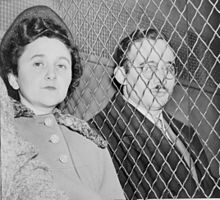Reality?
Both were guilty. That includes Ethel aiding Julius.
AND? It's also interesting that Sebba's book is only about Ethel. (OTOH, Sebba is almost exclusively a woman's biographer, per her Goodreads page.)
Setting aside Judge Kaufman's railroading of the trial, and setting aside David Greenglass' decades-later partial recantation of testimony against sister Ethel, that is still true today.
And was then, and was evident at the time, setting aside those issues above.
The release of the full grand jury testimony in 2008 made that even more clear.
The release of the Venona documents before that, specifically, material on them, made it clearer yet, as well as making clear that the Rosenbergs' espionage was not limited to the Manhattan Project. It also covered things like Anglo-American work on proximity fuses, themselves radar-based, America's first jet fighter and more. In these instances, rather than just confirming someone else (Klaus Fuchs), some of what the Rosenbergs were passing on was firsthand.
Of course, these claims of Rosenberg innocence are part of a litany of unskeptical lefties' purity tests that always start with the fact that the Hiroshima and Nagasaki bombs were uniquely evil, were dropped as anti-Soviet threats, and were not even the best way to end the war.
The reality is that (setting the Holocaust aside, or in East Asia and Japan, setting aside the Rape of Nanking and Unit 731), the bombing of Dresden and firebombing of Tokyo were at their own high levels of moral dubiousness, that the two bombs were dropped as the least bad (I have NEVER said "good" so STFU) way to end the war, and that blockade would not have ended the war for months, resulting on ongoing American, Allied and Japanese military and POW deaths, plus the deaths of more Japanese from starvation than from the two bombs.
Again, I've refuted this, or explain how authors have refuted this, in depth, starting with my review of "Unconditional," then to an expansion of my review of Frank's "Downfall," to a blog review of all the big issues at the 70th anniversary of Hiroshima,
The only real question is, given everything, and setting aside the issue of the morality or not of the death penalty in general (I oppose it), should the Rosenbergs have been executed?
I say, probably not on Julius and definitely not on Ethel.
But, both were guilty. Yes, Allen Young and yes Sebba. (Venona shows that she recruited Greenglass, and much more, regardless of whether she typed Julius' notes up or not. [Yes, it's John Schindler. Still true.] Alexander Vassiliev has offered more. Mark Kramer offers a LOT more.) And, per comment near the top, it's interesting the focus on just Ethel. It's like even a fair chunk of non-skeptical lefties recognize the case for Julius is a lot harder to make, especially since their own kids have abandoned it.
But, as John Schindler (yes, I know his own history) makes clear in the first link in the above paragraph, no, there's plenty of goods on Ethel. And, reading blurbs of the book, like other hand-waving lefties, Sebba appears to officially ignore Venona.
As for the Rag Blog? It doesn't have that many posts, and of the ones it does, at least one-quarter of them that stick in my mind are non-skeptical leftism like this.

Not that it relates to guilt of Rosenberg's but they and Fuchs were not the only spies.
ReplyDeletehttps://smile.amazon.com/Bombshell-Secret-Americas-Atomic-Conspiracy/dp/081292861X/ref=sr_1_8?dchild=1&keywords=bombshell+book+manhattan&qid=1624999499&sr=8-8
And nothing happened to this guy...
Ted Hall was a physics prodigy so gifted that he was asked to join the Manhattan Project when he was only eighteen years old. There, in wartime Los Alamos, working under Robert Oppenheimer and Bruno Rossi, Hall helped build the atomic bomb. To his friends and coworkers he was a brilliant young rebel with a boundless future in atomic science.
Fuchs and Hall were much more useful too the Russians.
"Cousin," good to hear from you. And, right on Ted Hall. The Rosenbergs, from what I know, had the most value as being a second confirmation of what Fuchs was already telling the Russians, and when you worked for the paranoiac Stalin, a second source was always good.
ReplyDelete